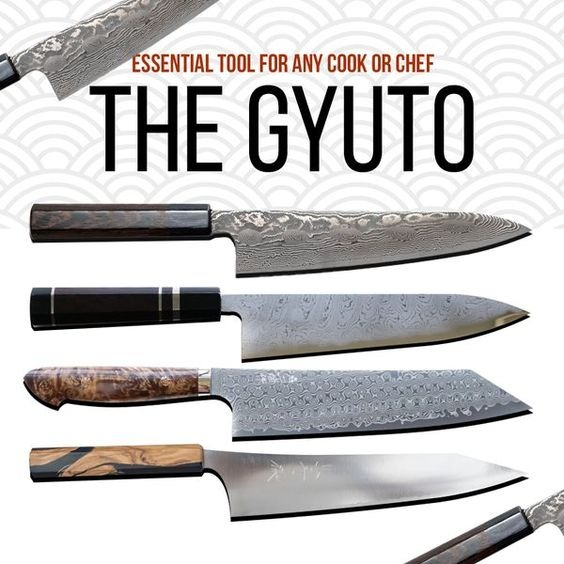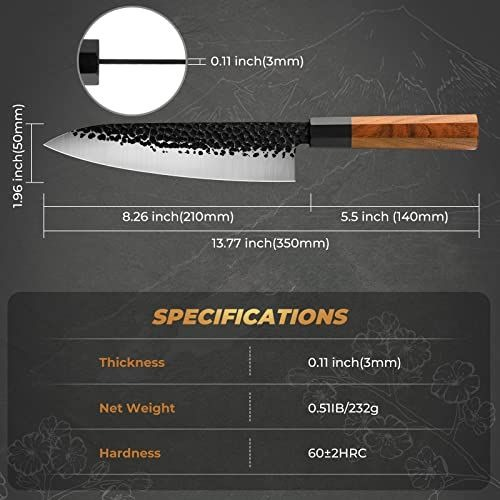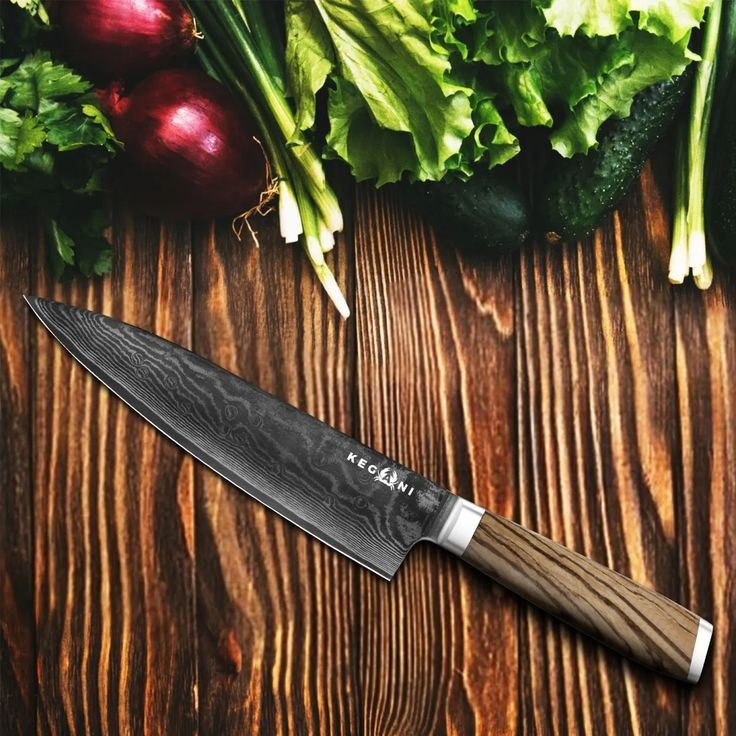Why Every Kitchen Needs a Gyuto Knife - Discover the Difference

It doesn't matter if you're a professional chef or just someone who likes to cook at home. Having the right tools in your kitchen is essential for creating delicious and beautiful meals. One tool that often gets overlooked but is actually crucial for any kitchen is the Gyuto knife. This versatile and highly functional knife has been used in Japanese cuisine for centuries and is gaining popularity in kitchens all over the world.
In this article, we'll explore the reasons why every kitchen needs a Gyuto knife and how it can make a difference in your cooking experience.
Let's go!
What is a Gyuto Knife?
A Gyuto knife, also known as a chef's knife, is a multi-purpose kitchen knife that originated in Japan. It is designed for chopping, slicing, dicing, and mincing various types of food. The word "Gyuto" translates to "cow sword," which reflects its history of being used for cutting large pieces of meat. Today, chefs use it for a wide range of kitchen tasks, and it has become a staple in both professional and home kitchens.
Characteristics of a Gyuto Knife

Below are some of the characteristics that make a Gyuto knife stand out from other chef knives:
-
Versatile Blade Length - The blade of a Gyuto knife ranges from 180mm to 270mm, making it perfect for various tasks such as slicing vegetables or carving meats.
-
Exceptional Sharpness - With its razor-sharp edge, a Gyuto knife can achieve paper-thin slices, making it ideal for preparing delicate dishes like sushi.
-
High-Quality Construction - Gyuto knives are made from high-carbon steel. They offer better edge retention and hardness, which is crucial for chefs who demand the best.
-
Ergonomic Handle Design - The handles of Gyuto knives are crafted for comfort and control, with an ergonomic design that reduces fatigue during prolonged use.
-
Precise Cutting - With narrow blades, Gyuto knives allow for precise and clean cuts, making them essential when working with intricate dishes or delicate ingredients.
-
A Blend of Tradition and Innovation - Inspired by the samurai sword tradition, Gyuto knives combine traditional techniques with modern advancements in materials and ergonomics.
-
Versatility at its Best - Unlike specialized knives like paring knives or slicing knife, Gyuto knives are incredibly versatile. It makes them the go-to choice for many professional chefs.
Gyuto Knives vs. Western Knives
While Western-style chef knives have been the go-to option for many years, Gyuto knives are gaining popularity because of their unique features and advantages. Below is a table that highlights the differences between Gyuto knives and traditional Western chef knives:
|
Feature |
Gyuto Knife |
Western Chef Knife |
|
Blade Length |
210mm - 240mm |
8-10 inches |
|
Steel Type |
High-carbon stainless steel |
Softer stainless steel |
|
Edge Hardness |
58-65 Rockwell |
52-58 Rockwell |
|
Maintenance |
Requires care but highly durable |
Easier but less durable |

Let's now get to the main question - why should every kitchen have a Gyuto knife? Here are some compelling reasons that make a Gyuto knife an essential kitchen tool for every kitchen:
Superior Precision in Cutting
The Gyuto knife is a well-known Japanese knife that is highly valued for its razor-sharp blade. It is popular among chefs and home cooks alike for its superior precision in cutting, allowing for effortless thin slicing. Due to its ability to achieve clean, precise cuts, it is an ideal choice for preparing delicate dishes such as sushi.
With blade lengths usually ranging from 210mm to 270mm, the Gyuto knife provides ample space for slicing through large vegetables and cuts of meat. The high-carbon steel or stainless steel used in Gyuto ensures superior edge retention. It results in long-lasting sharpness and reduces the need for frequent sharpening.
The Pinnacle of Japanese Craftsmanship
The Gyuto knife is a testament to the pinnacle of Japanese craftsmanship. These Japanese knives are crafted with meticulous attention to detail, drawing from the same techniques used to forge samurai swords.
The blade types, whether carbon steel or stainless steel, are chosen for their superior qualities, including hardness HRC (Rockwell Hardness Scale), which contributes to edge retention and stain resistance. Each Gyuto is not just a knife; it's a piece of history embodying centuries of Japanese tradition and expertise in every slice.
Versatility
The Gyuto knife is highly versatile and can perform many tasks efficiently. Its narrow blade and ergonomic handle allow for a rocking-type motion, making it perfect for mincing herbs and making precise cuts.
Unlike knives designed for specific tasks, such as peeling fruits or making thin slices, the Gyuto Japanese knives can be used for dicing onions, julienning carrots, or carving a roast. It is a go-to knife for professional chefs and culinary enthusiasts alike.
Ergonomic Design for Comfort and Safety
The Gyuto knife features an ergonomic design that includes a wooden handle, which fits comfortably in the hand. This handle and a well-balanced blade minimise hand fatigue and reduce the risk of accidents. As a result, professional chefs who spend extended hours in the kitchen and home cooks can rely on this knife for a safe and comfortable cutting experience.
Efficiency in Food Preparation
In a fast-paced kitchen, efficiency is crucial. The Gyuto knife is a versatile tool with a sharp blade that helps speed up food preparation. Its ability to chop vegetables, slice meats, and even peel fruits quickly and accurately makes cooking more efficient. This is why the Gyuto knife is popular both in professional kitchens and at home.
Easy Maintenance and Care
The Gyuto knife is a high-performing and high-quality kitchen tool that does not require extensive maintenance. With proper care, such as regular honing and appropriate storage, these Japanese knives can maintain their efficiency and sharpness for years.
The stainless steel variants are more convenient to care for than their pure carbon steel counterparts as they are stain-resistant. To prolong the life of a Gyuto, it is advisable to clean the knife after each use and avoid the use of a dishwasher. By following these simple steps, you can ensure that your Gyuto knife becomes a lasting addition to your kitchen.
Top Considerations for Buying a Gyuto Knife

Before purchasing a Gyuto knife, there are essential factors to consider to ensure you get the best one for your needs. Here are some key considerations:
Blade Length
As mentioned earlier, Gyuto knives come in different blade lengths, usually ranging from 210mm to 270mm. So, consider what tasks you will use the knife for, and choose a blade length that suits your needs.
Steel Type
Gyuto knives can be made of high-carbon stainless steel or softer stainless steel. So, understand them carefully to determine which one is more suitable for your needs.
Edge Hardness
The hardness of a Gyuto knife's edge, measured in HRC (Rockwell Hardness Scale), can greatly affect its performance and durability. A higher HRC means a harder edge, which can maintain sharpness for longer but may be more prone to chipping. So, you should choose one according to your preference and usage.
Blade Type
Gyuto knives can have either a double-edged or single-edged blade. Single-edged blades are more commonly used in traditional Japanese knives, while double-edged blades are more suitable for general kitchen tasks. So, understand your needs and preferences before choosing a blade type.
Maintenance
As with any kitchen tool, maintenance is crucial to ensure its longevity. Therefore, consider how easy it is to maintain and care for a Gyuto knife before purchasing.
By doing so, you can ensure that you find the best knife for your cooking needs and make it a valuable addition to your kitchen.
FAQ
How Do I Sharpen a Gyuto Knife?
To sharpen a Gyuto knife, you'll need a whetstone. So, begin by soaking the stone in water for 10-15 minutes. Then, lay the flat side of the blade on the edge of the whetstone at a 15-20 degree angle and move it across the stone in a circular motion. Repeat this process on both sides until you achieve your desired sharpness.
Can a Gyuto Knife Be Used by Beginners?
Yes, a Gyuto knife is a suitable choice for beginners due to its versatile design, which includes a balanced weight and ergonomic handle. So, as long as proper safety measures are followed, anyone can easily use a Gyuto knife.
What Is the Best Material for a Gyuto Knife?
High-carbon stainless steel is the most commonly used material for Gyuto knives. It offers a good balance of sharpness, durability, and stain resistance. However, softer stainless steel variants are also available.
Best Place To Buy a Gyuto Knife
In short, the Gyuto knife is a versatile and high-quality kitchen tool that can be a valuable addition to any kitchen. So, if you are looking to buy a Gyuto knife, Sakuto is the best place to go. We offer a wide range of high-quality Gyuto knives which have been made with premium materials and ergonomic designs. These are suitable for both professional chefs and home cooks.
In addition, Sakuto provides excellent customer service and affordable prices which makes it the ideal choice for those looking to invest in a reliable and efficient Gyuto knife.
Visit our collection page now and find the perfect Gyuto knife that suits your needs.






